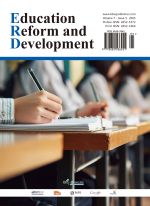Abstract
The College Computer CAP (Chinese Advanced Placement) is a common prerequisite computer course offered by many universities in China. It plays a vital role in bridging computer education between high schools and universities. However, with the development and widespread application of AIGC (Artificial Intelligence Generated Content) technology, the outdated teaching content and practices struggle to meet the requirements for cultivating students’ knowledge, skills, and information literacy in the intelligent era. Based on an analysis of the necessity of introducing AIGC technology into the College Computer CAP course, this paper elaborately presents the teaching reform and practice carried out on this course at Northwest A&F University, which integrates AIGC technology in teaching content and practices. In terms of teaching content, this reform deeply integrates the introduction and practical application of AIGC technology and some practical intelligent tools. In teaching practices, this reform uses AIGC technology to assist in personalized learning resource recommendation, intelligent learning guidance and Q&A, and the generation of diverse practical teaching cases. The corresponding reform and practice content proposed in this paper has significant reference value for universities offering the same course.
References
Zhou W, 2024, Teaching Design and Practice of Blended Courses under the Student-Centered Concept, thesis, Wuhan Sports University.
Zheng J, 2022, The Application of Blended Teaching Model in the Cultural Value Guidance of Colleges and Universities. China Journal of Multimedia & Network Teaching (Mid-Month Edition), 2022(9): 77–80.
Zhao A, 2020, Investigation and Research on the Current Situation of Blended Teaching in Vocational Colleges. Vocational & Technical Education Forum, 36(6): 71–76.
Li H, 2022, Research on Future Classrooms Based on Intelligent Technology: Observation and Evaluation, thesis, East China Normal University.
Song J, 2024, The Empowerment and Innovation of ChatGPT for Education and Teaching in China. Foreign Language Education and Translation Development and Innovation Research, 15: 3.
Sun J, 2024, AIGC-Empowered Classroom Teaching Reform in Application-Oriented Undergraduate Courses: Taking the Course of Principles and Applications of Big Data Technology as an Example. Office Automation, 29(19): 45–47.
Li Y, Gui Z, 2024, AIGC-Empowered Blended Teaching: Concept Innovation, Resource Optimization, and Model Transformation. The Science Education Article Collects, 2024(9): 53–57.
Li B, Bai Y, Zhan X, et al., 2023, Technical Characteristics and Morphological Evolution of Artificial Intelligence Generated Content (AIGC). Documentation, Information & Knowledge, 40(1): 66–74.
Tao W, Shen Y, 2024, From ChatGPT to Sora: Four-Ability Education and Paradigm Innovation for AIGC. Modern Educational Technology, 34(4): 16–27.
Zhu Z, Dai L, Hu J, 2023, High-Awareness Generative Learning: Innovation of Learning Paradigms Empowered by AIGC Technology. E-Education Research, 44(6): 5–14.
Zhang W, Xiang D, Xu S, et al., 2018, Construction and Practice of CAP Courses under the Background of College Entrance Examination Reform. University Chemistry, 33(3): 27–31.
Lin N, 2015, Teaching Research on Data Structure and Algorithm Courses Based on the CAP Model. Scientific and Technological Innovation, 2015(33): 1–5.
Lan Y, 2016, Exploration of Teaching Reform and Practice of College Computer Basic Courses. Chinese Information, 2016(9): 1–5.
Wang H, Li P, 2019, Exploration and Practice of Teaching Reform of Computer Public Courses. Digital User, 25(52): 394–395.
Wu L, 2025, Experimental Research on Task-Driven Teaching in General High School Information Technology Courses, thesis, Hebei Normal University.
